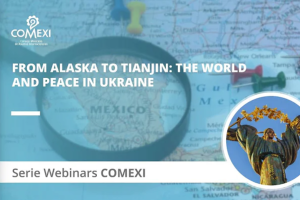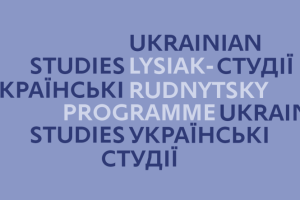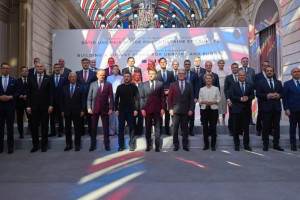On the fears, problems and sources of information for the residents of the occupied areas of Donbas – public discussion
Fears, problems, plans for the future of the residents of occupied Donbass, what are their sources of information, their attitude to the war after 4 years, their opinion on who is guilty for it - these were the topics for discussion led by experts, civic activists and journalists in Severodonetsk and Kramatorsk.
First, Ruslan Kermach, political analyst of the Ilko Kucheriv Democratic Initiatives Foundation (DIF), presented the results of focus group studies, which have been held in the eight cities of Luhansk and Donetsk regions.
Even after four years of war in the Donbas, the residents of temporarily uncontrolled territories believe that EuroMaidan protests, aspirations of European integration, manifestations of radicalism and nationalism in Ukraine, the desire of the new Ukrainian authorities to ban the Russian language, the reluctance of Kyiv to "hear" Donbas, the desire of Donbas to get an autonomy for a fair distribution of produced values between the center and the region ("Donbass feeds Ukraine"), as well as a geopolitical conflict between Russia and the United States were the main causes of the armed conflict.
“It is noteworthy that nobody (in the focus groups – aut.) indicated the factor of Russian aggression as a main cause of the conflict, but at the same time some SDDLR[1] residents, according to respondents do not conceal their desire to join Russia under the Crimean scenario. Therefore some residents of SDDLR are currently blaming those who promised them a quick “entry” into Russia. In general, most of the causes and versions of the conflict shift the responsibility from Donbas citizens to external and outside factors (Ukrainian authorities, Kyiv, nationalists, the US)" – Ruslan Kermach told.
Participants of the discussion in Kramatorsk and Severodonetsk actively reacted to the results of the study, confirming the reported facts. There were also many complaints about the lack of access to information from Ukrainian TV channels and radio stations.
“Ukrainian TV channels are jammed, it is nearly impossible to switch to them. The only adequate source of information for us is Hromadske Radio. Its program “Kyiv-Donbas” takes into account the situation in the Donbas providing us the information that we really need, - commented one of the participants of the public discussion in Severodonetsk.
Indeed, the results of the study show that the main source of information for residents of temporarily uncontrolled territories are Russian or local TV channels. At the same time, residents of Donbas on both sides of the frontline express their interest in the news content.
Ukrainian TV channels are almost unavailable on the uncontrolled territory of Donbas (although some people ‘catch’ the signal of certain Ukrainian TV channels in a poor quality, for example, the NewsOne), except for those who have satellite dishes or search for alternative information in the internet.
“At the same time, it is a widespread opinion among SDDLR residents that the Ukrainian TV channels provide false information, which often results in distrust or negative attitude towards the Ukrainian media," – Ruslan Kermach says.
Participants of the public discussion also negatively responded to the information policy of the Ukrainian authorities which demonstrated another aspect which contributes to the overall distrust and critical perception of the Ukrainian government, which in turn allows for the speculations by the Russian propaganda.
"For example, in May, our pensioners faced a delay with payment of pensions, which had to be paid already on May 17, but this has not been done yet. And we have no explanation for this, so people are worried, - one of the participants of the discussion in Severodonetsk said.
During the discussion it turned out that this situation was caused by certain bureaucratic moments and information about it was placed on official resources – web-pages of the Pension Fund and the Regional State Administration (RSA). However, no extensive information was provided, so, as an option, it was suggested to inform the target audience of changes through publications in communal newspapers that actually cover the main target audience in such situations.
In addition, there were comments regarding the lack of leverage available to activists and non-indifferent citizens to change the situation and solve problems in the Donbas region.
Valentyn Krasnopyorov, the head of the "Strong Communities" movement, offered his help in resolving such situations, appealing to his successful experience.
"We managed to bring to justice one of the city councils for not providing access to public information. Yes, it was necessary to reach the Ombudsman for this, but there is a result. And in general - we must start to act, unite and act, and change the situation," – said Valentyn Krasnopyorov.
Petro Burkovskyi, Head of the Political System Development Department at the National Institute for Strategic Studies (NIIS), political analyst at the Democratic Initiatives Foundation, outlined those aspects that need to be taken into account and adopted by the authorities in implementing policies on temporarily occupied territories.
"It is extremely important that citizens should feel the state’s readiness to take responsibility for their safety and for the protection of their rights in the event of warfare resumption. This requires the establishment of such military counteraction to the separatists, which would make the price of any attack or shelling of civilian objects (housing, hospitals, schools, critical infrastructure) high", - explained Petro Burkovskyi.
At the same time, the expert emphasized that the state should create the most comfortable conditions for the residents of the temporarily occupied territories to return them back to Ukraine. This concerns the conditions for crossing of the entrance-exit checkpoints for all as well as the process of verifying pensioners, because complaints about the process of obtaining a pension are the most frequent and most acute. Students and applicants who do not see their future in the so-called DPR and LPR should have a good alternative to obtain higher education in Ukraine. It is also very important to ensure the availability of affordable medical services and medical care for everyone who needs it in the settlements of Donetsk and Luhansk regions.
Summarizing the results of studies and discussions, analysts of the Democratic Initiatives Foundation (DIF) also recommended conducting a thorough review of citizens' perceptions of public policy at the governmental level, analysis of reasons for efficiency or inefficiency in certain areas. According to analysts’ view it is also important, to call for more in-depth research of public opinion and attitudes of the residents of Donbas in order to make decisions that will enable to prepare the citizens for resolution of the conflict in the region under acceptable scenarios for Ukraine.
The study was conducted within the framework of the «Confidence Building Initiative» Project (UCBI II), funded by the United States Agency for International Development (USAID).








